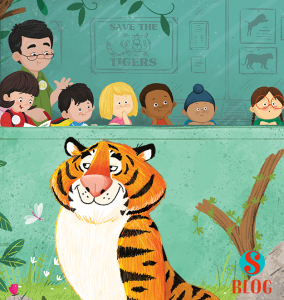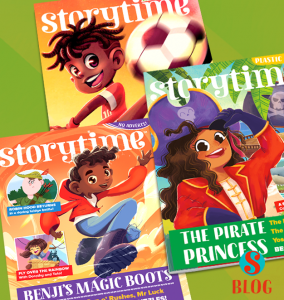

Here at Storytime, we create stories for our readers – and we want all of our readers to find characters that they can identify with in our stories. That’s why we believe that diversity matters. How boring would the world – or our magazine – be if everybody looked, thought and talked the same?
This month, we are honoured to have the second guest editorial of the year by the immensely talented Nick Abadzis. He is, amongst many other things, an award-winning comics creator and graphic novelist. He is currently writing and drawing a new book entitled Skin Trouble, which will deal with issues around diversity and representation. Nick is very passionate about the importance of representation in stories and we are so happy to be able to share his thoughts on the matter in our blog. We believe his work is striking and very relevant in bringing greater awareness to this hugely important topic. (c) Nick Abadzis 2022
Why Diversity Matters: A Guest Editorial?
“Diversity” is a word that is often used to describe humanity. We are indeed “diverse,” in that we are many and myriad. Human beings come in innumerable flavours and that, to me, is a fabulous and beautiful thing. It’s our differences, our self-awareness and our ability to co-operate that make human beings the most powerful animal species to ever walk the surface of this planet. Simultaneously, it’s what makes us so dangerous – to all other life that we share this world with, and to ourselves.
 Every one of us is unique and as different from one another as is every single snowflake that ever fell out of the sky over our heads. And, like snow collectively, we form a vista that, from a distance, makes it difficult to tell one tiny element apart from another. In that sense, we are certainly more alike than unalike.
Every one of us is unique and as different from one another as is every single snowflake that ever fell out of the sky over our heads. And, like snow collectively, we form a vista that, from a distance, makes it difficult to tell one tiny element apart from another. In that sense, we are certainly more alike than unalike.
On our social, interpersonal, microscopic street level, things can be a little messier. Our societies are intricately structured, imperfect systems whose communications and (social) media generally reduce humankind’s organic complexity to simplistic, often binary terms that ignore or bypass nuance.
Nuance is a perceptual language all its own. Nuance, or the awareness of it, is the kind of emotional intelligence that any healthy society should aspire to teach their kids so that their lives will be as deep, rich and layered as their parents know they are capable of being.
Children are the future, and every good parent wants to equip their offspring with the tools they’ll need to cope with life and an ever faster, ever-changing world. Certainly, no-one wants their child to be seen as less than the set of potentials they present to their parents.
The declaration of human rights states that “All human beings are born free and equal in dignity and rights.” However, no matter how sound our foundational philosophies and intentions, however lofty our aspirations, all human societies remain unfair.
For this reason, representation in media – and all forms of human visual language – is of paramount importance.
Human systems nowadays tend to forsake nuance for brevity, difficult-to-digest facts for easily consumable half-truths or indeed, outright falsehoods. Yet life cannot be reduced to the kinds of absolutes that give us easy answers. Difference and sameness, conformity versus openness to other perspectives – it’s never this simple.
There are many reasons for this phenomenon, and I won’t attempt to examine any of them in detail here, but for the purposes of this short exploration into the importance of representation, it’s worth making the point that when any society seeks to reduce things to an ‘us versus them’ scenario, you know you are at the mercy of a very particular kind of storyteller – the powerful liar.
However, there are ways of approaching the contradictions of the world without either fear or the rhetoric of hatred. To fear is childish, to flounder and even glory in the absence of experience. To conquer fear is the courage of the childlike, to assume curiosity and interest over apprehension and suspicion. It’s in children that we find the many and myriad possibilities of humanity.
As children, we have greater capacity to grow and learn than at any other time in our lives. I’ve found that encouraging active mental channels back to my child-self and the innate, innocent curiosity I had back then – rather than any fear – has almost always enabled me to find pathways forward out of the depressing and stressful periods of my life.
It takes a bit of experimentation and experience to figure out how one’s own emotions really work – to not be controlled by them but make them work harmoniously for you in your everyday experience of the world.
As a professional storyteller, there have been many occasions when I have been asked how one teaches a sense of empathy, of connection, sympathy, rapport. Like any worthwhile project, it’s cumulative and ongoing. Stories equip children with information about the world in advance of actual experience.
 Of course, in the realm of storytelling, opposites are useful, as conflict is drama. Good and evil, light and shadow. Left and right, rich and poor, warlike and peaceful, happy and sad. Black and white. Us against Them. Me and the other. Me and Everyone Else.
Of course, in the realm of storytelling, opposites are useful, as conflict is drama. Good and evil, light and shadow. Left and right, rich and poor, warlike and peaceful, happy and sad. Black and white. Us against Them. Me and the other. Me and Everyone Else.
Tribalism is coded into us, which is why it can be weaponised and used against us. This is why it’s crucial that we teach our children to detect and recognise it and oppose it when it’s being used to manipulate us. Life isn’t black-and-white, or even simply shades of grey – not if we don’t want it to be.
Representation provides nuance. It’s both sophistication and an insurance against division and dehumanisation. Quite apart from that, it gives a child – or the wise adult that they’ll hopefully evolve into – a sense of place in a world that has a greater chance of reaching that aspirational goal of every individual truly being “free and equal in dignity and rights.”
It’s important for any child’s development to see themselves reflected back in the media they encounter. It’s pivotal, for their own imaginative development and evolving senses of empathy and sympathy, to give them the chances to see themselves in others, in fiction, in roles that might inspire them, whether it’s via stories on TV, in film, in literature, in comics, in games, in advertising, in public messaging of any sort. It’s essential for them to be allowed to play out of all sorts of possible roles in their minds (and most parents already know this instinctively).
For all the reasons above, representation is perhaps the most important aspect of all corners of modern storytelling, in whatever creative industry or media spotlight it may occur.
Never before has there been a moment in history when an understanding of difference as a positive has been so crucial. A connection to all our different possible and better selves has never counted like it does now, because it brings about an openness to communication and new ideas that will be essential to our long-term mass survival.
 Representation is one of the basic building blocks of fostering such understanding. Representation creates consideration and connection. Never before has it mattered so much that we foster relationships, awareness and understanding between the different peoples of this Earth.
Representation is one of the basic building blocks of fostering such understanding. Representation creates consideration and connection. Never before has it mattered so much that we foster relationships, awareness and understanding between the different peoples of this Earth.
Racial strife, prejudice, differences of belief and opinion aren’t going to go away if we begin to comprehend and represent the wide variety of this world’s inhabitants better, but it’s a good start. This world may be overheating, but it’s still beautiful, full of ideas, passions, sensory experiences and ways of being and seeing that you (and I) will never enjoy directly.
Living those, through stories, via storytellers, via fiction or via documentaries, diarists and journalists… it all makes the scope of life so much vaster and richer than our day-to-day grinds. I can only thank all those sharers of experience for these gifts, for all that insight. It helps me transcend my own parochialism.
One’s own attitude to and perception of the subjects of representation, diversity and inclusion may depend on multiple factors. What I’ve learned in a lifetime of listening and observing is that not many people actually do live in a vacuum, or honestly want to return to a time when we were hunter-gatherers being paranoid about the tribe in the next valley over. “Fear of the other” is the biggest lie humankind ever sold itself. But myths hold power. They shore up all the old systems and still work as the blinkered control-rhetoric of an elite, selfish few who ensure that things stay as they are.
Language is humankind’s oldest technology, and storytelling and shared information our most powerful tool, which is why we should always exercise it and process it thoughtfully. We all have this gene, this ability for telling stories, so tell them well. Don’t live in a world without imaginative sympathy, without benevolent curiosity.
Representation is one of the most important facets of all storytelling, a versatile lens through which we can view ourselves and extend the range of our knowledge and experience. We are humanity. We contain multitudes, and we can each all live several lifetimes inside of one, if we remain open to those possibilities.
We would like to thank Nick for taking the time to share his perspective with us. We hope you have found it as inspirational and thought-provoking as we did!
You can read more from Nick at his blog: https://www.nickabadzis.com/blog
We also recommend checking out Skin Trouble when it is released – we will be sharing it in our channels too and can’t wait to read it. Younger readers are sure to enjoy his comic Pigs Might Fly, which features spectacular illustrations too. It’s a fun adventure story about Lily Leanchops, who invents a flying machine to take on some wicked warthogs. We love it!




